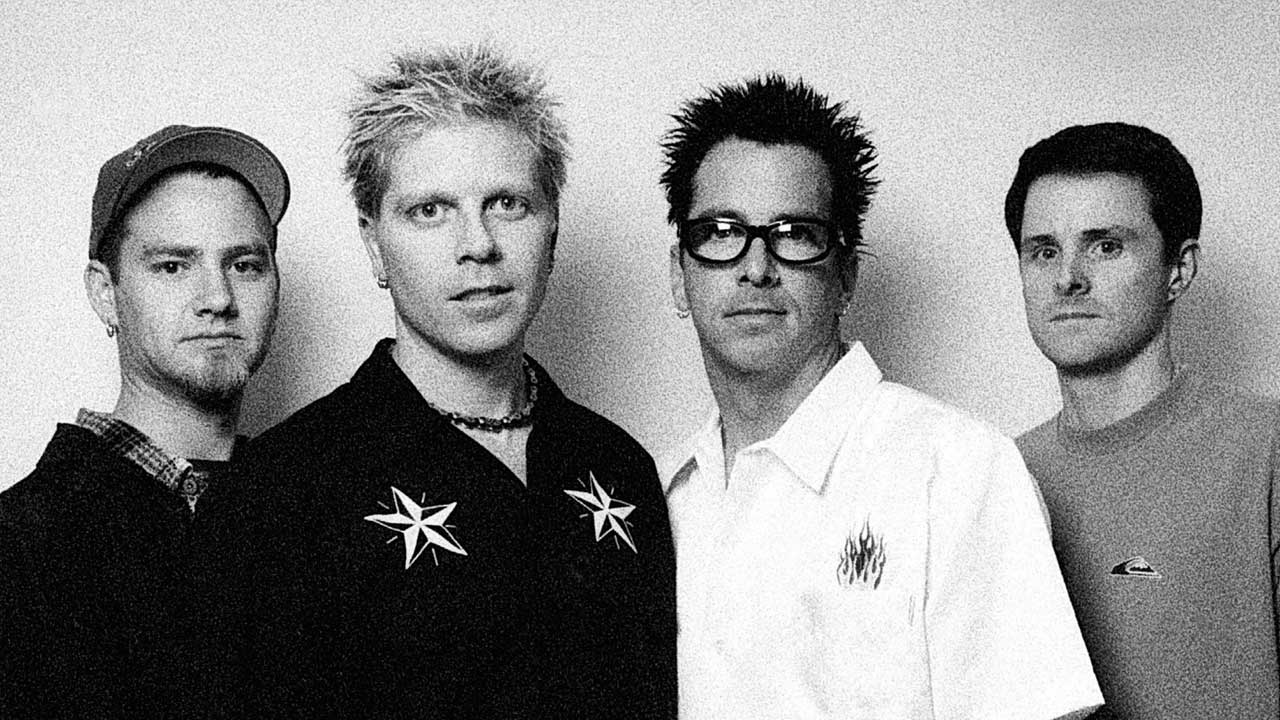
Had ’s frontman and chief songwriter Dexter Holland not swung by his local Starbucks for a caffeine hit in the mid-90s, the US punk rockers might never written their biggest song. Holland was sitting in his car, waiting in the drive-thru queue, when the server caught his attention. “There was a white kid with a sideways hat,” he recalls.
“Orange County is a pretty middle-ofthe-road place, and he was definitely out of his element in how he was presenting himself. He was trying to be something he definitely wasn’t. I was alone in the car and I just said it out loud to myself, like: ‘That guy’s pretty fly for a white guy.
’ It was like: ‘Ding ding ding! Whoa, that’s a good line!’” And so , a track that would become The Offspring’s sole UK No.1, was born. It was just the boost they needed.
Their 1994 third album had made the Californian quartet huge, but then just a few years later they were wondering if their time had passed. “We went from frickin’ zero to a hundred with ,” Holland recounts. “We couldn’t even sell out our local bar in Huntington Beach when came out, then all of a sudden, it was this worldwide thing, which was amazing.
” But rather than try to repeat the trick when it came to making a follow-up, they wanted to expand the styles in their sound. The approach didn’t pay off. The resulting record, 1997’s , stalled.
“It was inevitably the sophomore slump,” Holland reasons now. “I’m really proud of , I think it was really good, it just wasn’t , and that was by design. It’s almost like early on you got to do all the crazy stuff, so it doesn’t seem weird when you delve into different territories.
And Ixnay was that record for us, that vehicle for us.” Turning their sights towards the record that would become 1998’s , then, The Offspring were on the back foot. “We came off of going: ‘Well, jeez, that one didn’t do nearly as well as Smash.
Are we over?’ I didn’t feel like it was over, because we were feeling very creative.” Sign up below to get the latest from Classic Rock, plus exclusive special offers, direct to your inbox! The other thing driving Holland was that the band had already put in a lot of miles. Success hadn’t come to The Offspring immediately, and they were in it for the long haul.
“Before we’d been at it for ten years,” states Holland. “It definitely very much felt like a career band and this was just where we were at.” They set to work on making a record that continued the sonic experimentation of Ixnay but was a little more immediate in its tuneage.
Holland remembers that came somewhere in the middle of the album sessions. It was a song in the lineage of the band’s more left-of-centre material, such as the standout , which melded a raucous rock anthem with a Middle Eastern-tinged riff and an offbeat vocal. “ was in that sort of zone,” says Holland, “that mid-tempo thing.
It wasn’t really Middle Eastern, but it had kind of a Latin vibe to it in a way with the chord progressions.” One song he had in mind when writing it was the Latin-rock classic , made famous by ’s 1971 version. “It’s almost taking some of those elements and playing them in more of a punk style, taking a riff that wouldn’t normally be a punk riff and doing it with distorted guitars and seeing what you’ve got.
And that was it musically, that was the vibe.” Stewing on the idea for a couple of months, Holland knocked out a demo at home with a drum machine in a few hours “I’d thought about it for a long time and I had most of the lyrics together already, the ‘Give it to me baby’ and all that stuff.” He was aware that some people might dismiss it as a novelty, but he felt it was tapping into something that was actually happening: “I felt like there was just something going on at that time.
When we were recording the album in the studio, I felt like: ‘We have to get this out now because somebody is going to put this out before me. I can’t believe no one has done a song about a white guy trying to be gangsta. We got to get this thing done.
’” The rest of the band were on board with it. The group’s managers were 50/50, he remembers, a little worried that it might be too wacky. They weren’t the only ones.
“I remember doing some of our very first press with Australia, and the lady said: ‘We don’t know quite what to do with the song, half of us love it and half of us hate it,’” Holland says with a laugh. “I don’t know if that’s what I wanted to hear on my first interview! Maybe it was one of those kind of love it or hate it songs, and that added to its appeal – it got a reaction out of people.” Australia, as it happens, was one of the countries where was a huge success, No.
1 for six weeks. Holland knew they were onto something when it was getting repeat plays on MTV, but it was something else that really told him it was connecting. “We played this show in Italy and we went to a club after, and this guy with a really thick Italian accent said: “I know a guy exactly like that guy in my school.
” To me that was the most incredible thing, because I knew guys like that in Orange County and, in my head, I could see how this could translate to California or maybe the US. But the idea that a guy in Italy had the same reaction, the same feeling, was like: ‘Wow, this is really a global thing.’” (the finished track credits Joe Elliott and Steve Clark and producer as co-writers because it includes a sample of ’s at the start) set up The Offspring for another wave of huge success.
They were out of the doldrums. Holland will be forever thankful he went for that coffee. Tesseract announce expanded edition of latest album War Of Being, featuring new live tracks Epica release their second song in a month, tease even more music for 2025, will sleep when they’re dead "I went home and I wept that night": Actor Timothée Chalamet on filming the emotional scene where Bob Dylan visits the ailing Woody Guthrie in hospital and plays him a song Niall Doherty is a writer and editor whose work can be found in Classic Rock, The Guardian, Music Week, FourFourTwo, on Apple Music and more.
Formerly the Deputy Editor of Q magazine, he co-runs the music Substack letter with fellow former Q colleagues Ted Kessler and Chris Catchpole. He is also Reviews Editor at Record Collector. Over the years, he's interviewed some of the world's biggest stars, including Elton John, Coldplay, Arctic Monkeys, Muse, Pearl Jam, Radiohead, Depeche Mode, Robert Plant and more.
Radiohead was only for eight minutes but he still counts it..














